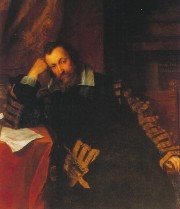Wednesday, 16 May 2007
Sir Walter Raleigh - 3
* * *
Poetry
Walter Raleigh is generally considered one of the foremost poets of the Elizabethan era. His poetry is generally written in the relatively straightforward, unornamented mode known as the plain style. C. S. Lewis considered Raleigh one of the era's "silver poets," a group of writers who resisted the Italian Renaissance influence of dense classical reference and elaborate poetic devices. In poems such as "What is Our Life" and "The Lie" Raleigh expresses a contemptus mundi (contempt of the world) attitude more characteristic of the Middle Ages than of the dawning era of humanistic optimism. However, his lesser-known long poem "The Ocean to Cynthia" combines this vein with the more elaborate conceits associated with his contemporaries Spenser and Donne, while achieving a power and originality that justifies Lewis' assessment, and contradicts it by expressing a melancholy sense of history reminiscent of "The Tempest" and all the more effective for being the product of personal experience. Raleigh is also Marlovian in terms of the terse line, e.g. "She sleeps thy death that erst thy danger sighed".
* * *
Raleigh in culture
* The 1955 film, The Virgin Queen, starring Bette Davis, Richard Todd, and Joan Collins, dramatizes the relationships between Queen Elizabeth, Raleigh, and his wife.
* Sir Walter Raleigh appears as a secondary character (bass) in Benjamin Britten's 1953 opera Gloriana.
* Raleigh's name is quoted in The Beatles' White Album song I'm So Tired, where the lyrics chide him for bringing the tobacco plant to England - "Although I'm so tired, I'll have another cigarette. And curse Sir Walter Raleigh. He was such a stupid git!". (A northern English expression meaning idiot).[8]
* Raleigh, North Carolina, takes its name from Sir Walter. The Hayes Barton neighborhood takes its name from his birthplace. There are other cities and towns in the New World named "Raleigh", and a misspelling of it in Rolla, Missouri
* Raleigh County in southern West Virginia is named for Sir Walter Raleigh.
* There is a noted brand of American pipe tobacco called "Sir Walter Raleigh".
* Sir Walter Raleigh's fictional autobiography is the subject of Robert Nye's novel The Voyage of the Destiny.
* The name "Sir Walter Raleigh" is sometimes used in the odd Prince Albert in a can joke.
* In February 2006, a bronze statue of Raleigh by sculptress Vivien Mallock was unveiled in the Devonshire village of East Budleigh. Costing some £30,000, it was a source of controversy as it had been part-funded by the British American Tobacco company.
* The title of his comedy History of the World, Part I by Mel Brooks is a reference to Raleigh having finished only the first volume of his Historie of the World at the time he was executed.
* Raleigh plays an important part in Anthony Burgess's novel A Dead Man in Deptford in which he is suggested as one of the persons who might have been responsible for the murder of Christopher Marlowe.
* In the second series of the television program Blackadder, Lord Blackadder tells Queen Elizabeth that he'll sail around the Cape of Good Hope to show up, as Blackadder calls him, Walter "Ooh What A Big Ship I've Got" Raleigh. Blackadder also refers to him as "Sir Walter Rather-a-Wally Raleigh". Raleigh is played by Simon Jones.
* One of Bob Newhart's stand-up comedy routines depicts one side of a telephone conversation between a skeptical businessman in London (played by Newhart) and "Nutty Walt" Raleigh who tries unsuccessfully to convince him of the merits of tobacco.
* Raleigh's relationship with Bess Throckmorton and Elizabeth I is the subject of a forthcoming film, The Golden Age starring Cate Blanchett as Elizabeth I, and Clive Owen as Raleigh.
* Raleigh is the subject of a chapter in William Carlos Williams' historicist essay titled In the American Grain (1925). Other chapters in the book are devoted to Hernán Cortéz, Juan Ponce de Leon, Hernando De Soto, Samuel de Champlain, and figures of American culture and politics.
See also
* The School of Night
Notes
1. ^ Many alternate spellings of his surname exist, including Rawley, Ralegh, and Rawleigh; "Raleigh" appears most commonly today, though he, himself, used that spelling only once, as far as is known. His most consistent preference was for "Ralegh". The name is correctly pronounced "rawley", though in practice "rally" is the usual modern pronunciation in England.
2. ^ a b Sir Walter Raleigh historical timeline, Elizabethan Era, 2005.
3. ^ Mark Nicholls and Penry Williams, ‘Ralegh, Sir Walter (1554–1618)’, Oxford Dictionary of National Biography, online ed., Oxford University Press, Oct 2006, ¶5, accessed December 29, 2006
4. ^ Fragmenta Regalia.
5. ^ Fuller's Worthys
6. ^ "Raleigh, Sir Walter", Encyclopædia Britannica Online, 2006.
7. ^ Durant, Will, The Story of Civilizationvol. VII, Chap. VI, p.158
8. ^ I'm So Tired, Steve's Beatles Page - Songs. Retrieved on 2006-01-19.
References
* Raleigh Trevelyan, Sir Walter Raleigh, 2003.
* J.H. Adamson and H.F. Folland, Shepherd of the Ocean, 1969.
* C.S. Lewis, English Literature in the Sixteenth Century Excluding Drama, 2004.
* Robert Naunton, Fragmenta Regali 1694, reprinted 1824.
* Thomas Fuller, Angolorum Speculum or the Worthies of England, 1684.
* The Sir Walter Raleigh Collection in Wilson Library at the University of North Carolina at Chapel Hill.
External links
Wikiquote has a collection of quotations related to:
Walter Raleigh
Wikisource
Wikisource has original works written by or about:
Walter Raleigh
* Sir Walter Ralegh's Grave
* Biography of Sir Walter Raleigh at Britannia.com
* Sir Walter Ralegh at the Fort Raleigh website
* Quotes attributed to Sir Walter Raleigh
Texts by Raleigh
* Works by Walter Raleigh at Project Gutenberg
o Project Gutenberg edition of The Discovery of Guiana
* Worldly Wisdom from The Historie of the World
Retrieved from "http://en.wikipedia.org/wiki/Walter_Raleigh"
http://en.wikipedia.org/wiki/Walter_raleigh
* * *
Subscribe to:
Post Comments (Atom)

No comments:
Post a Comment